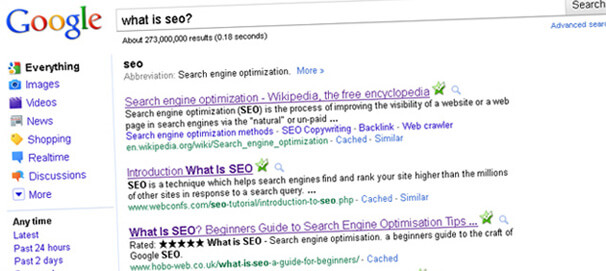Google SEO – What is SEO? Search Engine Optimization
Search engine optimization is the ubiquitous and all-powerful web marketing technique that can drive loads of target to your website. Online platform is all about ‘Survival of the Fittest’ and those fittest are the ones who figure in the top search engine results page.
Internet provides an answer to numerous things for us the moment our day begins. And when we search for a few things on the World Wide Web, we key in few specific terms into the search tool bar which will throw open a serpentine list of websites that are relevant to our search. So, it is these various online businesses in the form of websites that are vying for the top search engine ranks on the results page.
Online business exists and becomes successful if and only if there is an incessant flow of traffic which would later on get converted into sales. So, when the websites are thoroughly search engine optimized, the chances of the website getting lifted and indexed in the top search results become high.
Top rank on a major search engine, for instance Google, means tons and tons of traffic to your website. And when the website is SEOed in various significant aspects, the search engines rank it higher in comparison to million other sites.
Here is an effort to elucidate on the various aspects of Search Engine Optimization—an overview, how it works and the various ranking criteria that the major search engines take into purview while giving a website a particular ranking.
How do search engines actually work?
None of the search engines are humans…this is a fact and a basic truth that one needs to bear in mind when they are talking about search engines giving a rank to the websites in question. While people can discern they cannot understand the way humans and the major search engines view the websites and web pages. Search engines are purely driven by text and crawlers look for the text that has been keyed in the search tool bar and picks up a website that closely matches those terms or what we call the keywords.
Search engines, before delivering us the results in milliseconds, perform a series of activities. They crawl, index, process, calculate relevancy and retrieve the information from the relevant web pages…all of this accomplished in a matter of few seconds.
The search engine spiders crawl the websites to find out if anything relevant is there and this is performed by the Googlebot in case of Google. It is the spiders that follow various links and move on from one web page to another and enroute index those web pages they find relevant. As there are billions of web pages on the World Wide Web, it becomes highly impossible for the spider to check if something new has been included in a web page. At times, the crawlers may not even visit your website for a long time.
Once the search engine spider crawls the web page it indexes the content and stores the same in a huge database which it will retrieve later. Indexing involves identifying the keywords. It is humanly impossible but the search engines do it with great aplomb. And when there is a search request, the request is processed…it compares these keywords with the indexed pages that are stored in the database. And as there are millions of pages that contain the keywords, the search engines begin to calculate the relevancy of these web pages.
Relevancy of the web pages is calculated by various algorithms that have relative weights assigned for some common factors like title tags, metatags, alt tags, links, and keyword density. That is the basic reason why we get different search results for the same search strings on different search engines. And the major search engines like Google, Yahoo, MSN and Bing keep changing their algorithms periodically. So, if you want your website to feature on the top page ranks, you need to modify your web pages in accordance with the changed algorithms of the search engines.
The final step of the search engine’s results is the retrieval of the information which is nothing but displaying the results in the SERPs. And these results are a whole list of web pages that have been sorted from highly relevance to low relevance.













